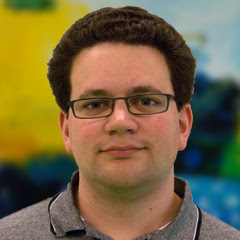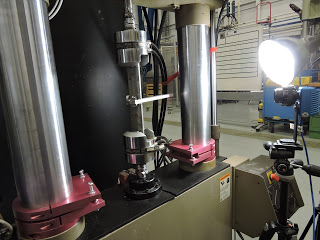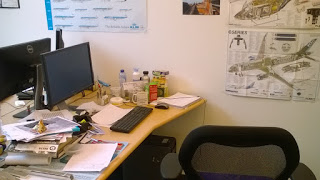I am John-Alan Pascoe and This is How I Work
 Today, I am inviting John-Alan Pascoe in the “How I Work” series. John-Alan was born and raised in the Netherlands, he studied Aerospace Engineering at Delft University of Technology, obtaining his MSc. in 2012. After a brief spell as a researcher in order to sort out funding, he started on his PhD at the Structural Integrity & Composites group at TU Delft. He works on understanding how cracks grow in glue that is subjected to repeated load cycles, and hopes to defend his PhD thesis in October 2016.
Today, I am inviting John-Alan Pascoe in the “How I Work” series. John-Alan was born and raised in the Netherlands, he studied Aerospace Engineering at Delft University of Technology, obtaining his MSc. in 2012. After a brief spell as a researcher in order to sort out funding, he started on his PhD at the Structural Integrity & Composites group at TU Delft. He works on understanding how cracks grow in glue that is subjected to repeated load cycles, and hopes to defend his PhD thesis in October 2016.
Current Job: PhD Candidate at Delft University of Technology, Faculty of Aerospace Engineering
Current Location: Delft, The Netherlands
Current mobile device: Nokia Lumia 435 phone, Asus Transformer Pad TF-300 tablet
Current computer: Desktop PC both at home and work (not the same one obviously)
Can you briefly explain your current situation and research to us?
I am working on obtaining my PhD from Delft University of Technology. Like most people in the Dutch system, I am a full-time employee of the university. In my case my project is being funded by a grant from the Dutch government. Apart from doing research I also perform some teaching tasks such as giving lectures and supervising an MSc student.
My research is about fatigue in adhesive bonds. Basically, if you glue two pieces of metal together, and then pull on them lots of times, cracks will start to grow in the glue. Every time you pull the cracks will grow a little bit further. My research goal was trying to find out how to calculate how far the crack will grow if you know how hard you are pulling.
I’m currently on the last stretch of my contract (4 years in total) so I’m writing up my PhD thesis. The plan is to have a draft that is approved by my supervisors in June, so I can defend my thesis in October.
What tools, apps and software are essential to your workflow?
For the experimental part of my research: Excel & Matlab (for processing my data), Labview (software that controls some of the measuring equipment I use), and Photoshop (for measuring crack lengths from photographs, that way I don’t need to sit next to my specimens all the time).
For writing: Latex for text editing and EndNote for managing my references.
What does your workspace setup look like?
I have a fixed desk in an office I share with 3 other PhD candidates. My desk tends to be quite messy, unless I feel like procrastinating. I usually can find everything without any trouble though. As you can see I drink a lot of tea.
For actual experiments I head to the lab, which is just down the corridor. In the lab I mainly use the 10 kN fatigue machine, which you can see in the picture.

What is your best advice for productive academic work?
Don’t work endless hours; keep your mind fresh by using the weekend and holidays to do something not related to your work.
If you feel like you need a break, try and procrastinate by doing something productive: do that paperwork that’s been lying around, make an outline for that conference presentation that’s not for another 2 months, make sure all your work is properly backed-up etc.
Everyone is different though, so find things that work for you and do that, regardless of other people’s helpful advice.
How do you keep an overview of projects and tasks?
I mainly do that in my mind, however I also use Outlook to flag e-mails that I still need to do something for so I don’t forget tasks.
Besides phone and computer, do you use other technological tools in work and daily life?
In my daily life not really (for a sufficiently narrow definition of ‘technological tool’). For my work I use a variety of equipment in the lab. The most important is the fatigue machine, which I use to pull my glued pieces of metal apart. The machine measures how hard it is pulling and how far it is moving. I also use a camera to take pictures so I can measure how long the crack in the glue is. I also did a couple of experiments where I used a special microphone to ‘listen’ to the ultrasonic sound waves that are emitted when the cracks grow.
Which skill makes you stand out as an academic?
I am good at pinpointing and questioning the implicit assumptions that people (including myself) use. That helps to determine what the fundamental questions are that need to be answered.
What do you listen to when you work?
I’m quite eclectic in my music tastes. Depending on my mood it might be classical music, pop, or rock, or even a mix of all three. On Mondays I usually check out what Spotify has suggested in the Discover playlist.
What are you currently reading? How do you find time for reading?
I’m currently reading the Dungeon’s & Dragon’s 5th edition player’s handbook as with the group of friends I have a weekly roleplaying session with we want to start playing in that game system soon. I’m also currently reading Saladin Ahmed’s Throne of the Crescent Moon, and a history of the Ilyushin aircraft design bureau (it was not accident I ended up studying aerospace engineering).
I usually read a bit before going to sleep at night. I also read whenever I’m traveling. I do find I need to actively make time for reading on occasion though.
Are you more of an introvert or extrovert? How does this influence your working habits?
I tend more towards introverted, although I’m more shy than strongly introverted. In my normal work I usually only interact with people I know, so it doesn’t have much effect.
At conferences it can be a bit scary though, having to try to make conversation with people I don’t know (yet). My best advice for that is to try and get a presentation early in the program, so people will come to talk to you, rather than the other way round. Or you can just ask someone what their research topic is, that will keep most researchers I know going for a while.
What’s your sleep routine like?
I try to get 8 hours sleep a night, but I usually fail to go to bed in time for that. I usually end up going to bed around midnight. Three times a week I go swimming before work, and get up at around 6:30, the other days I usually get up at about 7:30.
What’s your work routine like?
Most days I arrive at about 9 and leave at about 5. If I’m in the flow of writing or need to get something finished that day I might stay later, though it’s very rare that I go home later than 6. I prefer to work productively from 9 to 5 and then do something non-work related in the evening, rather than being at the university all day and night without actually doing anything useful.
What’s the best advice you ever received?
Don’t listen to advice, from an advice column by the Dutch physicist Robert Dijkgraaf. (Though actually I’d rephrase it as: listen to advice, but don’t follow it blindly, find what works for you.)

